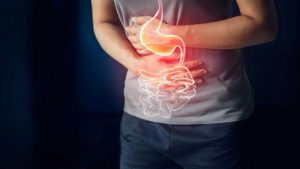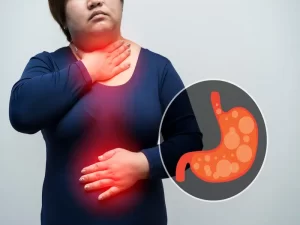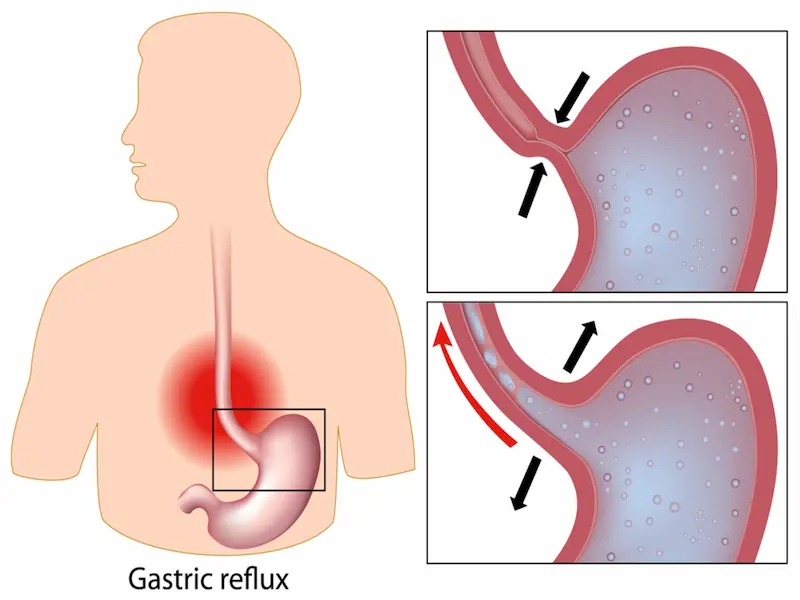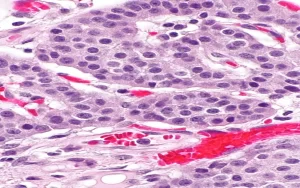Gastroesophageal reflux disease (GERD) occurs when stomach acid repeatedly flows back into the tube connecting your mouth and stomach (esophagus). The abnormal return of stomach acid to the esophagus and irritation of the esophagus due to the return of stomach acid is called gastric reflux. Food enters the stomach through a tube called the esophagus, and its digestion begins with stomach acid. In a normal state, there is a valve called the esophageal valve between the esophagus and the stomach, which allows food to enter the stomach from the esophagus, but prevents food from returning to the esophagus. If the esophagus is not closed well or is opened prematurely, the stomach acid will return into the esophagus and the esophagus will be damaged because the stomach has become resistant to stomach acid due to the high contact with this substance, but the esophagus has no resistance against it, which causes damage to the esophagus.
Doctors believe that if the symptoms of gastric reflux occur more than twice a week, the person is most likely suffering from this disease. Gastric reflux disease can be divided into different types. In classic reflux, stomach contents usually rise only in the esophagus and do not reach the pharynx. Classic reflux symptoms are more common in the form of heartburn.

Symptoms of gastric reflux
- Regurgitation: a sour or bitter-tasting acid backing up into your throat or mouth
- Heartburn: a burning pain or discomfort that may move from your stomach to your abdomen or chest, or even up into your throat
- Bloating
- Bloody or black stools or bloody vomiting
- Burping
- Dysphagia — the sensation of food being stuck in your throat
- Hiccups that don’t let up
- Nausea
- Wheezing, dry cough, hoarseness, or chronic sore throat
In general, indigestion is associated with pain and discomfort in the upper abdomen. Stomach discomfort, nausea and vomiting, and annoying fullness are symptoms of indigestion.
Learn more about the gastric sleeve
The main symptoms of reflux are heartburn and burning under the sternum, but many patients with reflux do not have these symptoms and only complain of the other symptoms listed. Fatty foods, spices, chocolate, caffeine, onions, soft drinks, alcohol and tobacco, overeating, obesity and pregnancy, lying down after eating, taking sedatives, some antihypertensive drugs and diseases such as diabetes and ulcers Stomach as well as stress are factors that aggravate gastric reflux.
The first step to improve reflux is to change the basic lifestyle and diet. The goal of the treatment diet is to prevent the return of esophageal contents, prevent pain and irritation of the inflamed esophagus mucosa, and reduce gastric acid secretions.
Doctors recommend focusing on the size of meals and their contents in reflux; Large and high-fat meals reduce the pressure of the lower esophageal sphincter (esophageal muscles), delay gastric emptying, and increase acid production, so eating small meals multiple times reduces the risk of stomach contents returning to the esophagus.
What factors increase the possibility of stomach reflux?
- obesity
- pregnancy
- Associated tissue disorders, such as scleroderma (the patient’s skin becomes thick, hard, and dry)
- Delayed gastric emptying
The relationship between obesity and acid reflux
Another cause of gastric reflux is obesity. Obesity causes an increase in intra-abdominal pressure, which is a factor in causing reflux and hiatal hernia, so weight loss in principle, with the advice of a doctor and along with diet, reduces the risk of reflux to some extent. Consuming too much food and eating food quickly causes the stomach to stretch. The result of stomach stretching is the opening of the esophageal valve, in which case stomach acid returns to the esophagus.
Today, weight loss and obesity surgery is one of the slimming solutions that are used even to control blood sugar.Dr. Abdullah Zandi, a bariatric surgeon and specialist with more than 20 years of experience in this field, you can visit her for obesity counseling and treatment in Tehran
The relationship between asthma and acid reflux
Those who get involved in gastric reflux, then get respiratory diseases (asthma). Asthma and gastric reflux are usually related because the acid blocks the respiratory valves when it returns to the esophagus. Therefore, the person can hardly breathe. In this case, hiccups are normal, so hiccups cause stomach irritation. Then the person will experience an increase in gastric reflux due to restlessness and fatigue.

How to reduce symptoms
The first step in the treatment of gastric acid reflux is diet, proper exercise program and taking prescribed medications. But the problem becomes complicated when the person is obese and the person’s body does not respond to conventional and basic methods to lose weight. In such a situation, the doctor may suggest slimming surgery such as gastric bypass surgery or gastric sleeve surgery, which in Both methods try to maintain the patient’s health. Avoiding high-acid foods such as citrus juice, tomatoes, pickles and spices is effective in reducing gastric reflux, as well as consuming high-fat foods, fried foods, sauces, ready-made foods such as sausages and sausages, chocolate, Sweetened drinks, tea, coffee, pickles and spicy foods should be reduced as much as possible.
Doctors recommend consuming anti-flatulent foods such as mint and oregano, which reduce the pressure of the lower esophageal sphincter. In addition to changing the diet, changing the way of life can also be effective in controlling this disease; Among others, avoiding smoking, avoiding eating food two to three hours before going to bed, avoiding wearing tight clothes, lying down after eating and also raising the head while sleeping can be useful for people who have night reflux.



